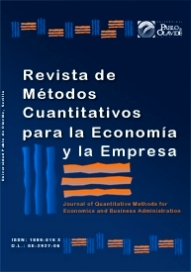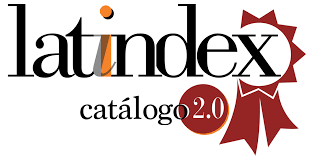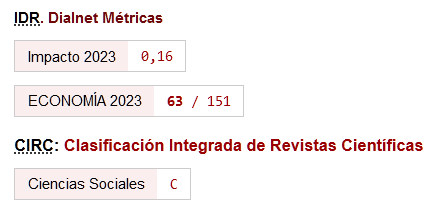Inequality of subjective economic uncertainty and individual economic prospects in the pandemic period
DOI:
https://doi.org/10.46661/rev.metodoscuant.econ.empresa.7558Keywords:
economic behavior, expectations, survey, pandemic, inequalityAbstract
This article studies which factors influence the appearance of subjective economic uncertainty and what are the economic expectations of individuals. The impact of the pandemic on the household economy and the subjective uncertainty based on a set of socioeconomic factors that cannot be observed in macroeconomic studies on uncertainty are analyzed. We use data from a survey conducted in October 2021 taking a representative sample of Catalonia (Spain). The results suggest that individuals in households with greater saving capacity are those who express less uncertainty regarding their future economic situation and women show greater future uncertainty than men. This study finds evidence that there is an association between age and economic expectations, with older people being the most pessimistic. However, age is not associated with a greater presence of subjective uncertainty, so we can conclude that there has not been a deterioration of confidence in the elderly.
Downloads
References
Ahrends, C., Bravo, F., Kringelbach, M.L., Vuust, P. & Rohrmeier, M.A. (2019) Pessimistic outcome expectancy does not explain ambiguity aversion in decision-making under uncertainty. Sci Rep 9, 12177 (2019). https://doi.org/10.1038/s41598-019-48707-y
Alessie, R., & Lusardi, A. (1997). Saving and income smoothing: Evidence from panel data. European Economic Review, 41(7), 1251-1279. https://doi.org/10.1016/S0014-2921(96)00023-2
Amo-Agyei, S. (2020) The migrant pay gap: Understanding wage differences between migrants and nationals. International Labour Organization, Geneva, Switzerland. http://www.oit.org/wcmsp5/groups/public/---ed_protect/---protrav/---migrant/documents/briefingnote/wcms_763796.pdf
Arrondel, L. (2002) Risk management and wealth accumulation behavior in France, Economics Letters, 74, 187-194. https://doi.org/10.1016/S0165-1765(01)00528-6
Baker, S. R., Bloom, N., Davis, S. J., & Terry, S. J. (2020a). Covid-induced economic uncertainty. National Bureau of Economic Research, Working Paper 26983, https://doi.org/10.3386/w26983
Baker, S. R., Farrokhnia, R. A., Meyer, S., Pagel, M., & Yannelis, C. (2020b). How does household spending respond to an epidemic? Consumption during the 2020 COVID-19 pandemic. The Review of Asset Pricing Studies, 10(4), 834-862. https://doi.org/10.1093/rapstu/raaa009
Carroll, C. D., & Samwick, A. A. (1998). How important is precautionary saving? The Review of Economic and Statistics 80, 410-419. https://doi.org/10.1162/003465398557645
Christelis, D., Georgarakos, D., Jappelli, T., & Kenny, G. (2020). The Covid-19 crisis and consumption: survey evidence from six EU countries. ECB Working Paper, No 2507, December. https://doi.org/10.2139/ssrn.3751097
Costa, A., Galletto, V., Garcia, J., Raymond, J. L. & Sanchez-Serra, D. (2020). El Coste de la Vida en las Comunidades Autónomas, Áreas Urbanas y Ciudades de España. IERMB Working Paper in Economics, nº 20.01, Institut d'Estudis Regionals i Metropolitans de Barcelona.
GESOP (2021). "El Ómnibus de GESOP" Consultado el 13/12/2021: https://gesop.net/wp-content/uploads/2019/03/FITXA_El_Omnibus_ESP.pdf
Gieseck, A., & Rujin, S. (2020). The impact of the recent spike in uncertainty on economic activity in the euro area. Economic Bulletin Boxes, 6. https://ideas.repec.org/a/ecb/ecbbox/202000064.html
Guillen, M., Santolino, M. & Vidal-Llana, X. (2022). Desigualdad de la incertidumbre económica subjetiva y perspectivas económicas individuales en el periodo depandemia. Documento de trabajo de IREA 2022/02, 1-22.
Harris, M. N., Loundes, J., & Webster, E. (2002). Determinants of household saving in Australia. Economic Record, 78(241), 207-223. https://doi.org/10.1111/1475-4932.00024
Hoxhaj, R. (2015). Wage expectations of Illegal immigrants: The role of networks and previous migration experience. International Economics, 142, pp. 136-151. https://doi.org/10.1016/j.inteco.2014.10.002
Hurd, M. D. (2009). Subjective probabilities in household surveys. Annual Review of Economics, 1(1), 543-562. https://doi.org/10.1146/annurev.economics.050708.142955
Jappelli, T., & Pistaferri, L. (2000). Using subjective income expectations to test for excess sensitivity of consumption to predicted income growth. European Economic Review, 44(2), 337-358. https://doi.org/10.1016/S0014-2921(98)00069-5
Krüger, F., & Pavlova, L. (2020). Quantifying Subjective Uncertainty in survey expectations. KIT - Die Forschungsuniversität in der Helmholtz-Gemeinschaft, Working Paper Series in Economics, No. 139. http://dx.doi.org/10.11588/heidok.00026507
Levenko, N. (2020). Perceived uncertainty as a key driver of household saving. International Review of Economics & Finance, 65, 126-145. https://doi.org/10.1016/j.iref.2019.10.005
Lumley, T., & Scott, A. (2017). Fitting regression models to survey data. Statistical Science, 265-278.
https://doi.org/10.1214/16-STS605
Mahía, R. (2021). Los efectos del COVID-19 sobre la inmigración en España: economía, trabajo y condiciones de vida, Anuario CIDOB de la Inmigración 2020, p. 68-81. https://doi.org/10.24241/AnuarioCIDOBInmi.2020.68
Medina-Moral, E., Herrarte, A., & Vicens-Otero, J. (2010). Inmigración y desempleo en España: impacto de la crisis económica. Información Comercial Española (ICE): Revista de economía, 854, 37-48. http://hdl.handle.net/10486/664079
Morikawa, M. (2021). Uncertainty of firms' economic outlook during COVID-19 crisis. Discussion papers 21042, Research Institute of Economy, Trade and Industry (RIETI). CEPR Press. https://econpapers.repec.org/RePEc:eti:dpaper:21042
Núñez-Letamendia, L., Sánchez Ruiz, P. & Silva, A. C. (2021). Determinantes del ahorro de los hogares: La educación financiera protagonista. Observatorio del ahorro familiar. https://www.gref.org/nuevo/grefnoticias/hogares.pdf
Olsen, R. A., & Cox, C. M. (2001). The Influence of Gender on the Perception and Response to Investment Risk: The Case of Professional Investors. Journal of Psychology and Financial Markets, 2 (1), 29-36. https://doi.org/10.1207/S15327760JPFM0201_3
Pellegrino, G., Ravenna, F., & Züllig, G. (2020). The Impact of Pessimistic Expectations on the Effects of COVID‐19‐Induced Uncertainty in the Euro Area. Oxford Bulletin of Economics and Statistics, 83(4), 841-869. https://doi.org/10.1111/obes.12431
Pistaferri, L. (2001). Superior information, income shocks, and the permanent income hypothesis. Review of Economics and Statistics, 83(3), 465-476. https://doi.org/10.1162/00346530152480117
Sarin, R. & Wieland, A. (2016). Risk aversion for decisions under uncertainty: Are there gender differences? Journal of Behavioral and Experimental Economic, 60, 1-8 https://doi.org/10.1016/j.socec.2015.10.007
Singh, V.; Schiebener, J., Muller, S., Liebherr, M., Brand, M. & Buelow, M. T. (2020). Country and sex differences in Decision Making Under Uncertainty and Risk. Frontiers in Psychology, 11. https://doi.org/10.3389/fpsyg.2020.00486
Sribney, W. M. (1999). Two-way contingency tables for survey or clustered data. Stata Technical Bulletin, 8(45). https://econpapers.repec.org/RePEc:tsj:stbull:y:1999:v:8:i:45:svy7
Sproten, A. N., Diener, C., Fiebach, C. J. & Schwieren, C. (2018). Decision making and age: Factors influencing decision making under uncertainty. Journal of Behavioral and Experimental Economics, 76, 43-54. https://doi.org/10.1016/j.socec.2018.07.002
Von Gaudecker, H. M., & Wogrolly, A. (2021). Heterogeneity in households' stock market beliefs: Levels, dynamics, and epistemic uncertainty. Journal of Econometrics, in Press. https://doi.org/10.1016/j.jeconom.2020.11.011
Published
How to Cite
Issue
Section
License
Copyright (c) 2023 Miguel Santolino, Montserrat Guillen, Xenxo Vidal-LLana

This work is licensed under a Creative Commons Attribution-ShareAlike 4.0 International License.
Submission of manuscripts implies that the work described has not been published before (except in the form of an abstract or as part of thesis), that it is not under consideration for publication elsewhere and that, in case of acceptance, the authors agree to automatic transfer of the copyright to the Journal for its publication and dissemination. Authors retain the authors' right to use and share the article according to a personal or instutional use or scholarly sharing purposes; in addition, they retain patent, trademark and other intellectual property rights (including research data).
All the articles are published in the Journal under the Creative Commons license CC-BY-SA (Attribution-ShareAlike). It is allowed a commercial use of the work (always including the author attribution) and other derivative works, which must be released under the same license as the original work.
Up to Volume 21, this Journal has been licensing the articles under the Creative Commons license CC-BY-SA 3.0 ES. Starting from Volume 22, the Creative Commons license CC-BY-SA 4.0 is used.










